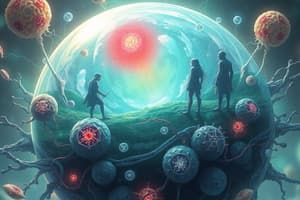Podcast
Questions and Answers
Which of the following components is a key mechanism of natural selection in the process of evolution?
Which of the following components is a key mechanism of natural selection in the process of evolution?
- Genetic drift
- Resource depletion
- Genetic mutation (correct)
- Environmental stability
Which statement accurately describes an aspect of the Cell Theory?
Which statement accurately describes an aspect of the Cell Theory?
- Only multicellular organisms are made up of cells.
- Cells are the basic unit of life and must arise from pre-existing cells. (correct)
- Cells can spontaneously arise from non-living matter.
- All cells have identical genetic material.
In biochemistry, which type of biomolecule is directly responsible for catalyzing biochemical reactions?
In biochemistry, which type of biomolecule is directly responsible for catalyzing biochemical reactions?
- Carbohydrates
- Nucleic acids
- Proteins (correct)
- Lipids
Which of the following best defines biodiversity in an ecosystem?
Which of the following best defines biodiversity in an ecosystem?
Which process results in the formation of gametes with half the chromosome number?
Which process results in the formation of gametes with half the chromosome number?
Which of the following accurately characterizes catabolism?
Which of the following accurately characterizes catabolism?
Which classification category encompasses both bacteria and archaea?
Which classification category encompasses both bacteria and archaea?
What does homeostasis refer to in physiology?
What does homeostasis refer to in physiology?
Flashcards are hidden until you start studying
Study Notes
Key Concepts in Biology
1. Cell Theory
- All living organisms are composed of cells.
- The cell is the basic unit of life.
- All cells arise from pre-existing cells.
2. Metabolism
- The sum of all chemical reactions in an organism.
- Divided into two categories:
- Catabolism: Breaks down molecules to release energy.
- Anabolism: Builds up molecules using energy.
3. Genetics
- Study of heredity and variation in organisms.
- Key terms:
- Gene: Basic unit of heredity.
- Chromosome: Structure containing genes.
- Allele: Different forms of a gene.
4. Evolution
- Change in the genetic composition of populations over time.
- Natural selection is a primary mechanism of evolution.
- Common ancestor concept leads to the diversity of life.
5. Classification of Life
- Domains: Bacteria, Archaea, Eukarya.
- Kingdoms: Animalia, Plantae, Fungi, Protista.
- Organisms classified based on characteristics and genetic relationships.
6. Ecology
- Study of interactions between organisms and their environment.
- Key concepts:
- Ecosystem: A community of living organisms and their physical environment.
- Food Chains/Webs: Pathways of energy transfer through trophic levels.
7. Physiology
- Study of the functions and mechanisms in a living organism.
- Includes:
- Homeostasis: Maintaining stable internal conditions.
- Organ systems: Groups of organs working together (e.g., circulatory, digestive).
8. Biodiversity
- The variety of life forms in an ecosystem.
- Important for ecosystem stability and resilience.
- Threats include habitat loss, climate change, and pollution.
9. Biochemistry
- Study of the chemical processes within and related to living organisms.
- Major biomolecules:
- Proteins: Composed of amino acids; function in structure, enzymes, signaling.
- Carbohydrates: Sugars and starches; provide energy.
- Lipids: Fats and oils; important for cell membranes and energy storage.
- Nucleic Acids: DNA and RNA; store and transmit genetic information.
10. Cell Division
- Mitosis: Process by which a cell divides to produce two identical cells.
- Meiosis: Division producing gametes; reduces chromosome number by half.
Study Tips
- Use diagrams to visualize processes (e.g., cell structure, metabolic pathways).
- Flashcards for key terms and definitions.
- Practice labeling and explaining biological systems and processes.
Cell Theory
- All living organisms are made up of cells.
- Cells are the smallest unit of life.
- Existing cells form new cells.
Metabolism
- The sum of all chemical reactions in an organism.
- Catabolism: Breaks down molecules to release energy.
- Anabolism: Builds up molecules using energy.
Genetics
- The study of heredity and variation in organisms.
- Gene: Basic unit of heredity.
- Chromosome: Structure containing genes.
- Alleles: Different forms of a gene.
Evolution
- Change in the genetic makeup of populations over time.
- Natural selection is a significant driving force of evolution.
- Shared common ancestry explains the diversity of life.
Classification of Life
- Three domains: Bacteria, Archaea, Eukarya.
- Kingdoms: Animalia, Plantae, Fungi, Protista.
- Organisms are grouped based on characteristics and genetic relationships.
Ecology
- The study of interactions between organisms and their environment.
- Ecosystem: A community of living organisms and their physical environment.
- Food chains/webs: Pathways of energy transfer through trophic levels.
Physiology
- Functions and mechanisms within a living organism.
- Homeostasis: Maintaining stable internal conditions.
- Organ systems: Groups of organs working together (e.g., circulatory, digestive).
Biodiversity
- Variety of life forms in an ecosystem.
- Significant for ecosystem stability and resilience.
- Threats: habitat loss, climate change, and pollution.
Biochemistry
- Chemical processes within and related to living organisms.
- Major biomolecules:
- Proteins: Composed of amino acids, essential for structure, enzymatic function, and signaling.
- Carbohydrates: Sugars and starches, provide energy.
- Lipids: Fats and oils, important for cell membranes and energy storage.
- Nucleic acids: DNA and RNA, store and transmit genetic information.
Cell Division
- Mitosis: Process where a cell divides to make two identical cells.
- Meiosis: Division producing gametes (sex cells), reducing chromosome number by half.
Studying That Suits You
Use AI to generate personalized quizzes and flashcards to suit your learning preferences.




